Annual Research on Cities Summit (ARCS) 7.0
International Conference on
Sustainable Urbanism in the Global South
10th - 11th February, 2023
( HYBRID MODE )
Introduction:
The planet’s sustainability hinges on making our cities sustainable, and though it is only one of the 17 SDGs, almost two-thirds of the total 169 targets of all 17 SDGs need to be addressed in urban areas. Equally evident is that the cities of the global South carry a large part of this burden – for urban growth in the South is faster than in the global North, and 90% of the world population growth in the next two decades is expected to be in the global South. About 30 of the 40 megacities in the world are in the South, and so are most of those which are expected to become megacities in the next decade. Greening southern urbanism thus constitutes the most crucial sustainability challenge.
Policy, strategies, and technologies for green transitions in developing contexts are often transferred from the north by epistemic communities, consultants, and development organizations. However, there is little understanding of the variety of experiences when these are applied in southern contexts. Strategies in the global discourse – such as compact development, public transport, renewable energy, circular economies, transit-oriented development, blue-green planning, and green infrastructure, among others – do not map neatly onto southern urbanism due to the distinctively different characteristics.
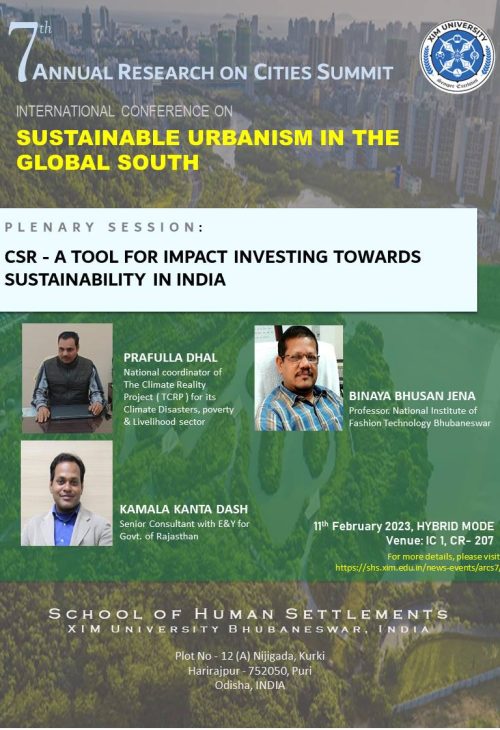
Many factors constrain cities in developing contexts. Priorities such as poverty alleviation, housing and basic services provision, inadequate finances, governance capacities, poor infrastructure, low technological development, and weak or absent urban planning and regulation displace or reshape the transplanted sustainability strategies and initiatives. Alongside, local perspectives, practices, and values inevitably configure different understandings and visions of sustainability. The concept, urgency, and systemic imperatives for sustainability are recast in these.
What are the various strategies and initiatives being applied in cities of the South? How are global discourses and experiences adapted, reshaped, or reinvented in the application context? What are the effects or sustainability outcomes? What are the unique challenges, and how are they met? What indigenous initiatives and innovations have emerged? Have traditional sustainability practices of the local contexts re-emerged and shaped urban sustainability in the South? More insights on these questions are required to identify effective paths to sustainable urbanism in the South.
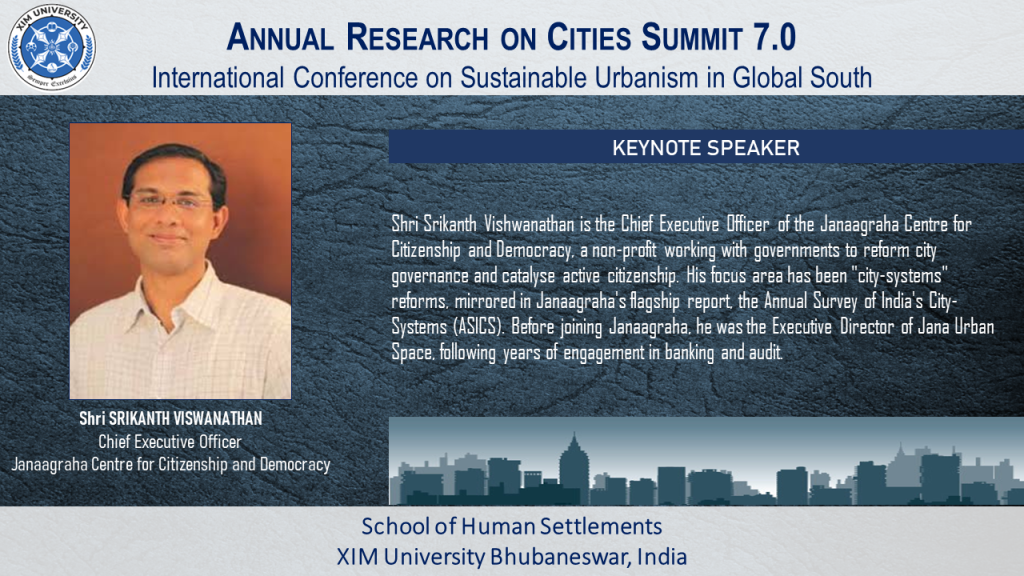

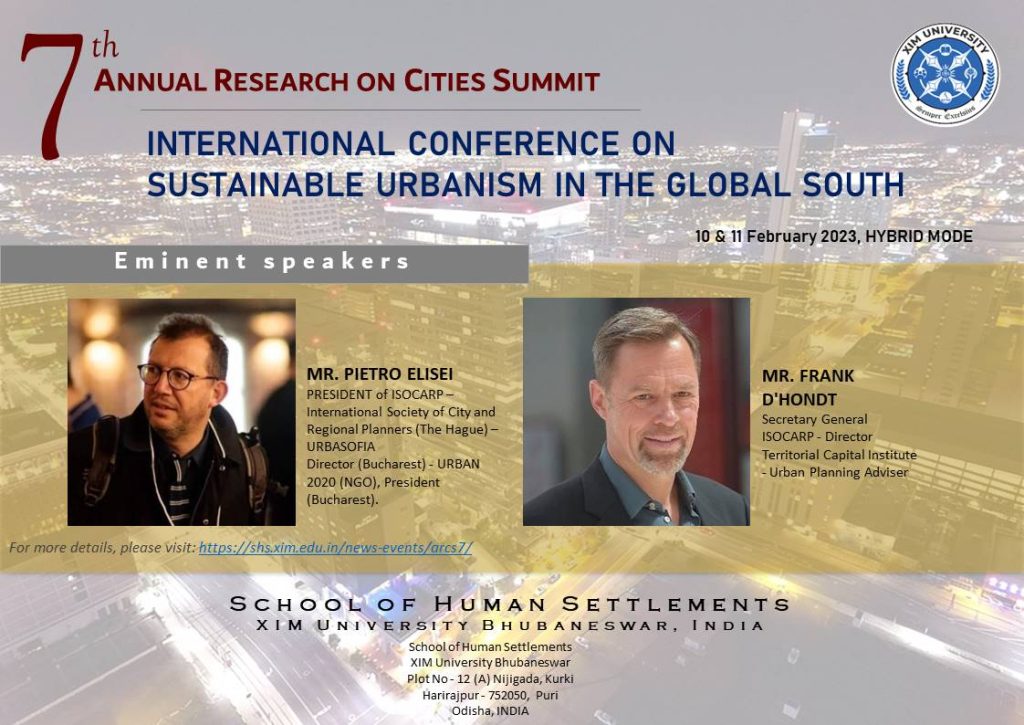
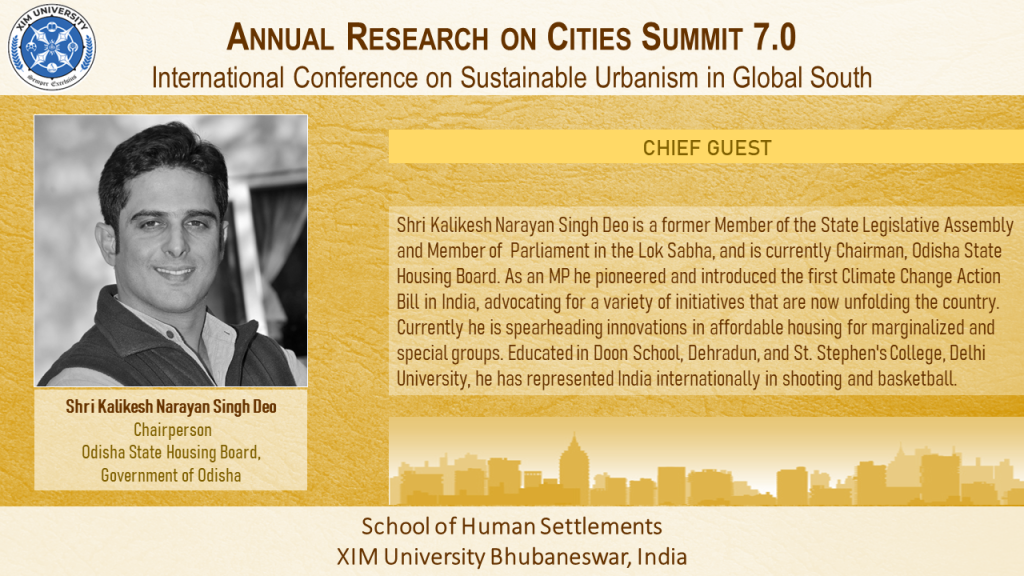
Call for Papers:
Papers, cases, reports on project and process experiences are invited from researchers, professionals, students, civic and policy actors on the questions of sustainable settlements in the global South for presentation at the International Conference on Sustainable Urbanism in the Global South, ARCS 7.0. The submission should be the original work of the authors. Submissions may relate to any one or more of the themes.
Conference Themes:
1. SDGs and cities of the global South
What innovative planning and development approaches have been adopted for sustainability? How are cities working towards SDG goals? How have financial constraints due to the Covid-19 pandemic and global economic slowdown impacted SDG targets?
2. Sustainable settlements planning
What are the dynamics of urban, peri-urban, and rural landscapes and their governance? Role of migration in shaping cities? What are the dynamics of the city region? What are the challenges in sustainable settlement planning and approaches? Exploring the rural-urban linkages and livelihood perspective.
3. Climate change and disaster risk reduction
How can we make climate-resilient cities? What are the approaches, policies, and innovative planning to reduce the impact of climate change? What are the challenges and solutions in making cities resilient to disaster? How can the differential impact of climate change and disaster be addressed?
4. Sustainable urban regeneration through placemaking
How to create public spaces considering beauty, quality, accessibility, connectivity, and resilience for sustainable urban regeneration? How is place making changes over identity, culture, and geography? How to address the challenge of inclusivity in sustainable urban regeneration through place-making? Gentrification and conflict between formal and informal placemaking.
5. Sustainable transportation
What are the sustainable ways of transportation in terms of their social and environmental impact? How can it be achieved? What are the new challenges and solutions in sustainable mobility?
6. Gender-sensitive and age-friendly cities
How to make cities inclusive of gender and age? How to involve them in the decision-making process? What are the innovative ways of designing these cities?
7. Digital solutions for sustainable cities
How can digital technology be used to make better decisions and improve quality of life? How do digital infrastructure and governance play an important role in channeling digital solutions for a safe future? What are the emerging aspects of digital urbanism? How to address the challenges of digital inclusion and divide?
8. Sustainable Health, Water, and Sanitation
Accessibility, quality, and equity in WASH are primary to achieving sustainability in this sector. What are the approaches to bringing these aspects to make cities clean, green, and healthy? What are the policies? What are the gaps?
9. Circular Economy of the global South
How does a circular economy promote resource-efficient living? What are the policy approaches and business strategies to improve resource productivity and promote sustainable consumption? How can it create livable and resilient cities? What are the challenges and innovative solutions?
10. Affordable housing and well-being
How is affordable housing contributing to the well-being of people? Role of housing in promoting good physical and mental health? What are the impacts of poor housing on the well-being of people in cities? What are the innovative solutions to the problem?
Call for Case Studies:
ARCS 7.0 calls for case studies to be included in topics related to urban development, planning, and management. This case study series is designed to show real-world applications of issues involving the design, development, delivery, evaluation, and management of the degree of urbanism within the global south. The segment is only dedicated to working professionals/consultants/
Call for Thesis presentations:
ARCS 7.0 calls for case studies to be included in topics related to urban development, planning, and management. This case study series is designed to show real-world applications of issues involving the design, development, delivery, evaluation, and management of the degree of urbanism within the global south. The segment is only dedicated to working professionals/consultants/
Registration:
All the attendees and presenters are required to register for the conference.
Registration Fee Include:
- Admission to the scientific session
- All-Conference materials
- An invitation to the Special event (cultural and dinner)
- Tea/coffee and lunch
- Certificate of Attendance (only to the registered attendees and presenters)
Note: The conference fee does not include accommodation and airport transfer.
Cancellation Policy: In case of cancellation or non-attendance, the registration fees are not refundable.
Categories | Registration Fees for Indian Nationals: | |||
Registration Fee |
Amount in INR | Remarks | ||
In-Person | Virtual | |||
Paper Presentation | Faculty/Professional delegates | 2950 | 1475 | Registration fees include 18% GST |
Student delegates (PG & RS) | 1770 | 590 | ||
Student delegates (UG) | 1180 | 590 | ||
Case-study Presentation |
Faculty/Professional delegates |
2950 |
1475 | |
Thesis Presentation |
Student delegates (PG & RS) |
1770 |
590 | |
Student delegates (UG) | 1180 | 590 | ||
|
|
| ||
| ||||
| Registration Fees for NRI and Foreign Nationals: | |||
Categories | Registration Fee |
Amount in INR | Remarks | |
In-Person | Virtual | |||
Paper Presentation | International delegates | 4825 | Free | Registration fees include 18% GST |
|
Registration Fees for accompanying person with the participant | |||
Categories | Registration Fee |
Amount in INR | Remarks | |
In-Person | Virtual | |||
Paper Presentation | Accompanying person with the participant/ attendee | 590 | Free | Registration fees include 18% GST |
Important Dates:
CALL FOR PAPERS | |
Submission deadline for abstracts: | 17th January 2023 |
Notification of abstract acceptance: | 20th January 2023 |
Registration and Payment deadline*: | 25th January 2023 |
CALL FOR CASE STUDIES | |
Submission deadline for abstracts: | 20th January, 2023 |
Notification of abstract acceptance: | 23rd January, 2023 |
Registration and Payment deadline*: | 27th January, 2023 |
CALL FOR THESIS PRESENTATIONS | |
Submission deadline for abstracts: | 20th January, 2023 |
Notification of abstract acceptance: | 23rd January, 2023 |
Registration and Payment deadline*: | 27th January, 2023 |
The Conference: | 10th to 11th February 2023 |
*Registration and Payment link will be open shortly.
Important Links:
Abstract (300-500 words) may be submitted to: https://forms.gle/HRbex9L39Wx7rQr99
Abstract template for submission: https://docs.google.com/document/d/1tH3EVPKkc7usW1w6H96ZEZSMPvksQrYt/edit
Case Study Proposal (500-1000 words) may be submitted to: https://forms.gle/
Thesis Abstract (300-500 words) may be submitted to: https://forms.gle/
All inquiries may be sent to: [email protected]
More Updates on:
SHS website: https://shs.xim.edu.in/
Facebook: https://www.facebook.com/humansettlements.XIMUniversity
Instagram: https://www.instagram.com/shs_xim_university/
Linkedln:https://www.linkedin.com/company/school-of-human-settlements-xim-university/
Submit the Abstract (300-500 words) in the given link: https://forms.gle/HRbex9L39Wx7rQr99
All inquiries may be sent to [email protected]
With great honor, we introduce our Distinguished Inaugural Speaker- Shri KUNAL KUMAR, IAS, Joint Secretary & Mission Director(Smart Cities), Ministry of Housing and Urban Affairs, Govt. of India. The inauguration event is on 10th Feb’22, 10:00 am to 11:15 am, online.
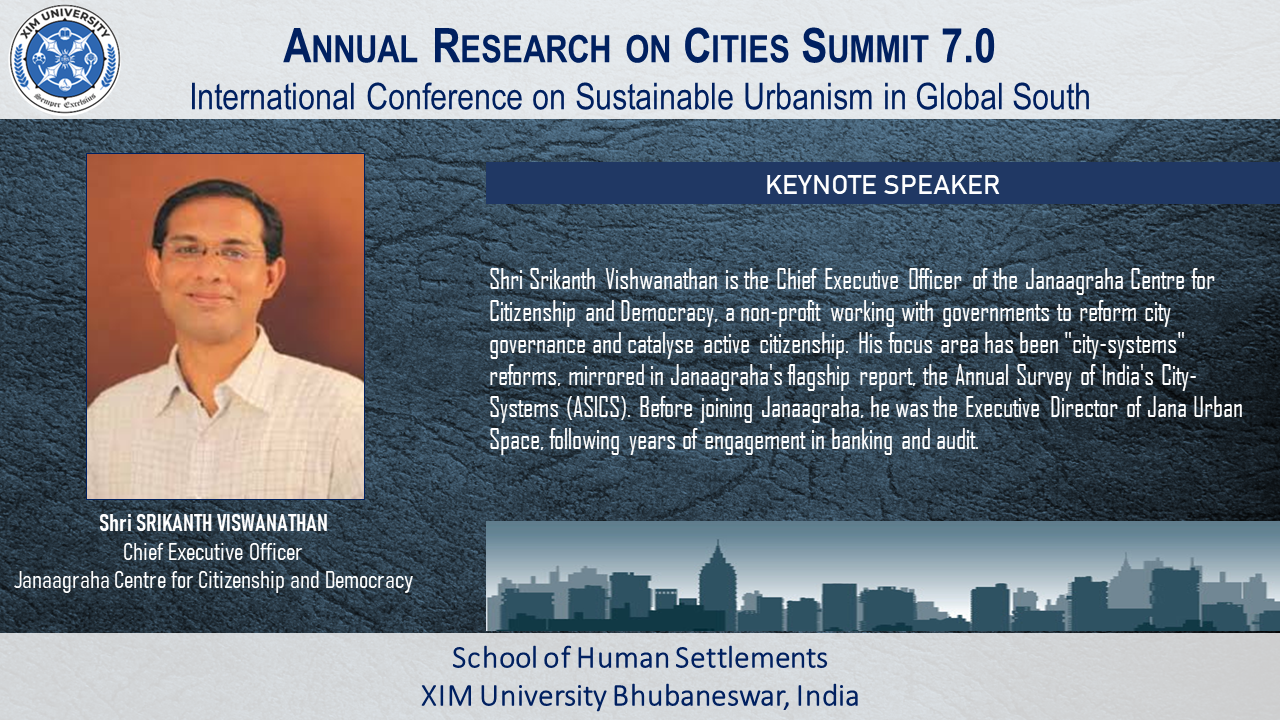
With great honor, we introduce our Distinguished Inaugural Speaker- Shri KUNAL KUMAR, IAS, Joint Secretary & Mission Director(Smart Cities), Ministry of Housing and Urban Affairs, Govt. of India. The inauguration event is on 10th Feb’22, 10:00 am to 11:15 am, online.
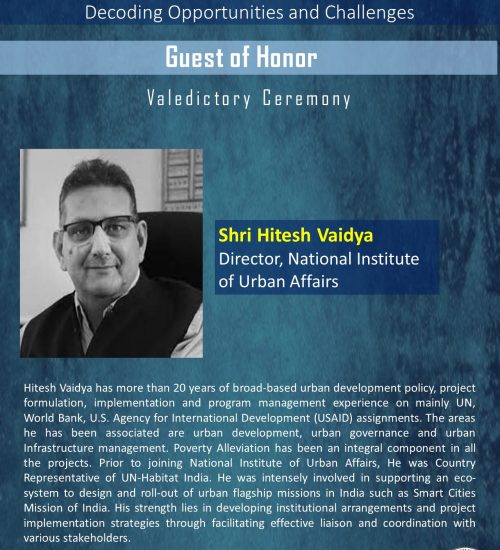
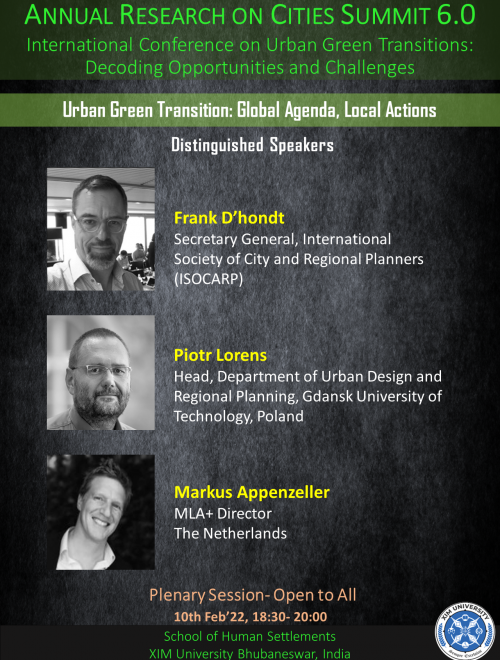
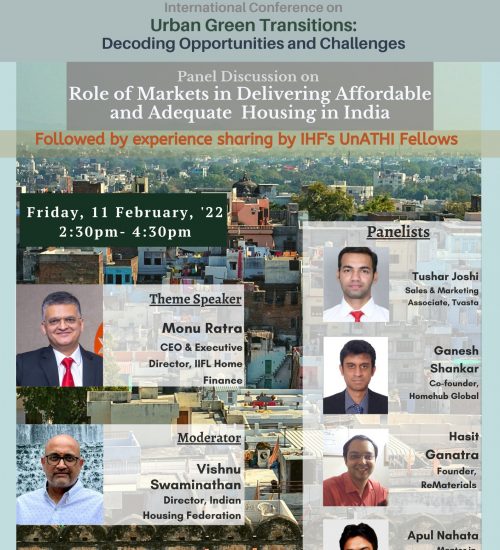
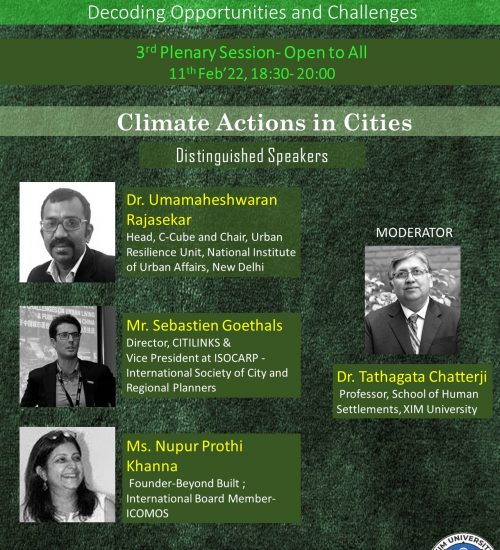
4th PLENARY SESSION – OPEN TO ALL on “Lessons from JAGA Mission: A participatory Slum Upgradation Programme in Odisha”
Speaker 1- Mr. Shishir Ranjan Dash – Lead,Urban Habitat, TATA Trust
Speaker 2- Mr Antarin Chakrabarty– Associate Fellow and State Team Lead, JAGA (Odisha Liveable Habitat) Mission at the Scaling City Institutions for India (SCI-FI) initiative at the Centre for Policy Research.
Speaker 3- Ms. Preeti Prada Panigrahi – Senior Manager Janaagraha; Founding Director -Re-imagine Ideas Foundation; Co-Founder -Enviro Aware
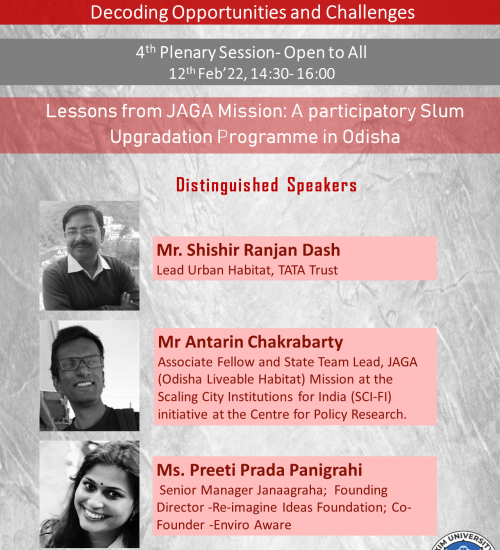
Meeting ID: 916 1182 0115
Passcode: 363981
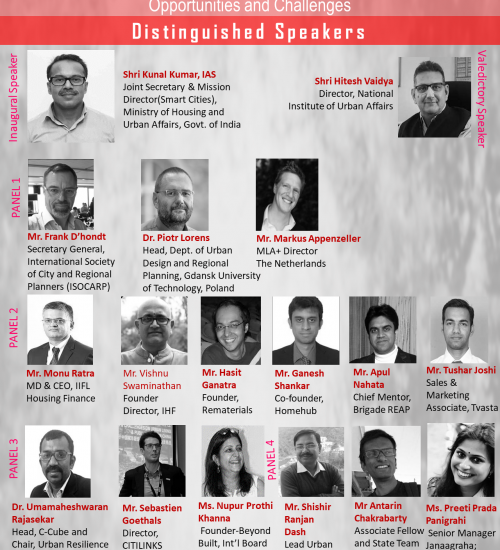
Theme- 2: Digital Transformation and E-Governance
Theme- 7: Gender-Sensitive Cities
Theme- 3: Environmental Risks and Resilience
Theme- 4: Housing & Shelter: Question of Affordability and Accessibility
Theme- 8: Urban Politics and City Leadership
Theme- 9: Urban Health, Water and Sanitation
Theme- 5: Public Space and Placemaking
Theme-10: Circular Economy and Green Finance
